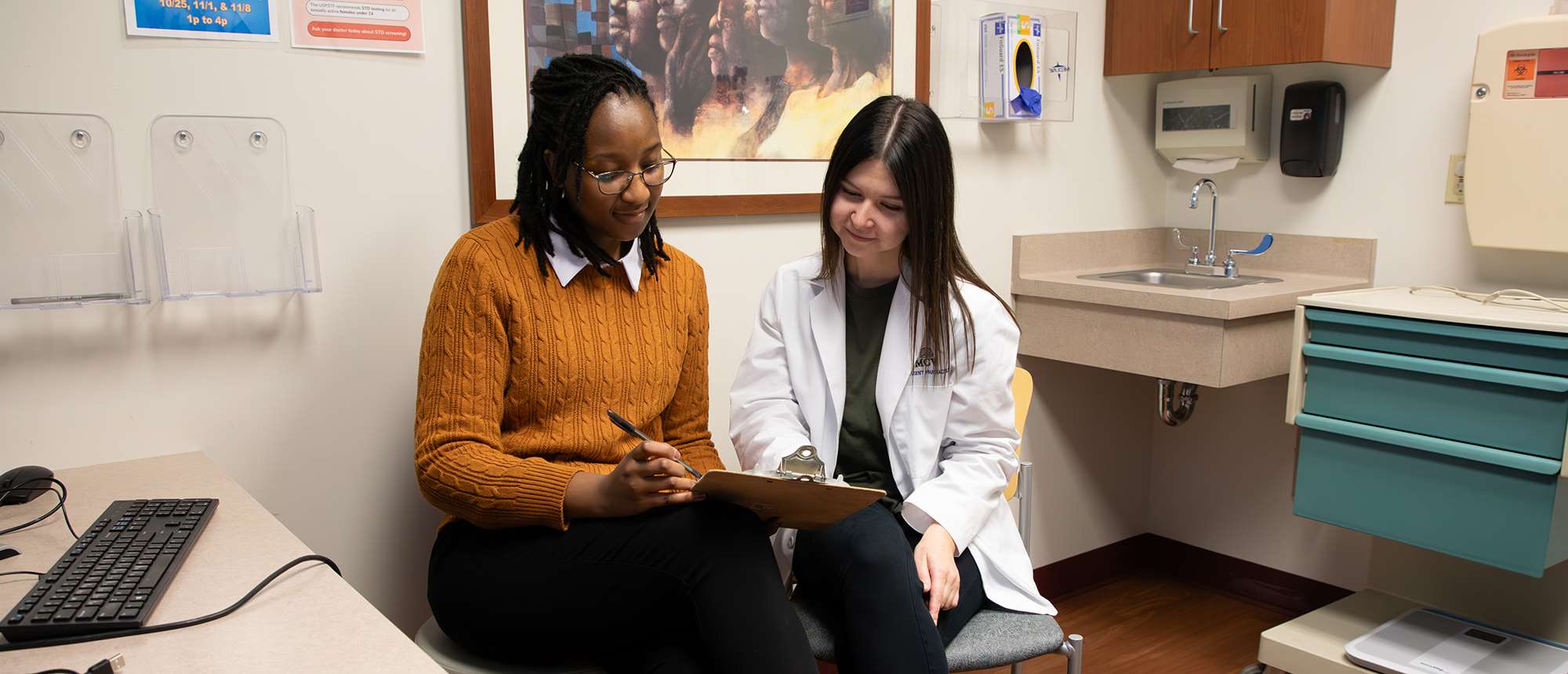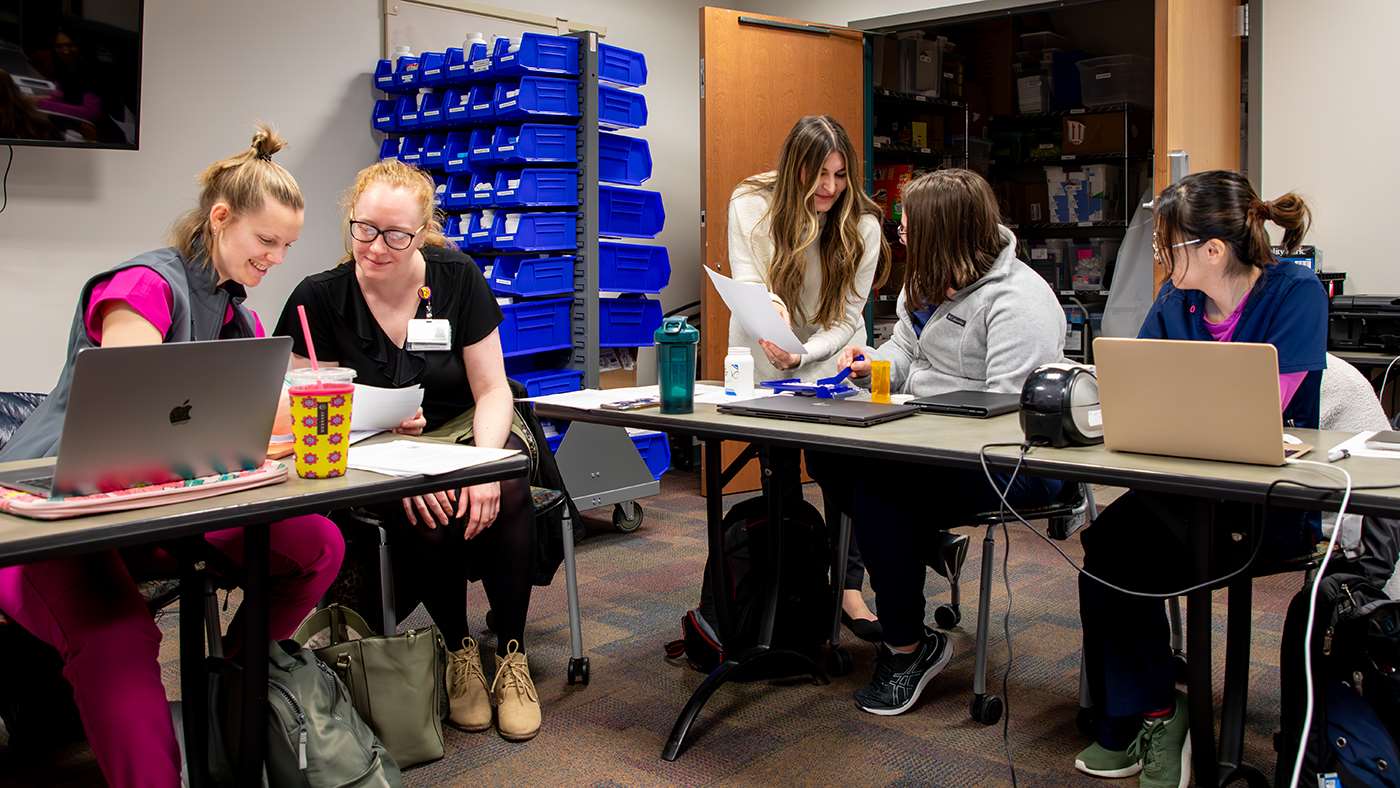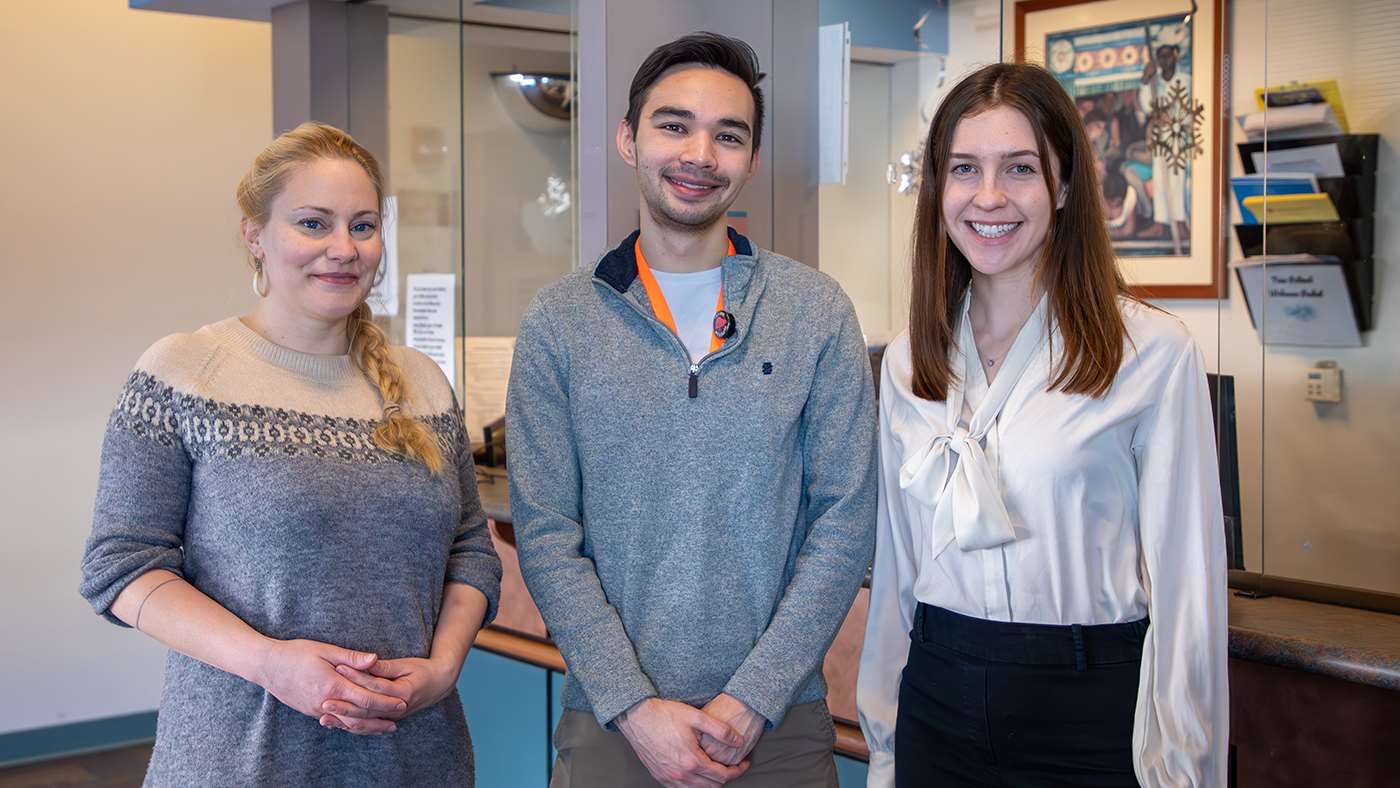Saturday Clinic for the Uninsured Achieves Gold Seal of Excellence

(l-r) Mutsa Chiromo (2026 MD candidate) and Brianna Albee (2025 PharmD candidate) collaborate in an exam room.
In November 2023, the Wisconsin Association of Free & Charitable Clinics (WAFCC) awarded the MCW-affiliated Saturday Clinic for the Uninsured (SCU) the Gold Seal of Excellence. The determination is made based on achievement of the WAFCC Standards of Excellence, which are measurable guidelines that aid clinics in providing quality care and optimizing accessibility.
MCW’s medical and pharmacy students run the clinic under faculty supervision, utilizing an interprofessional model of care delivery that strives to understand, serve and promote the health and wellness needs of uninsured patients in Milwaukee while simultaneously educating future healthcare professionals.
In addition to MCW’s students and faculty, an intertwining network of partnerships make SCU possible: donors provide funding; volunteer physicians and pharmacists such give their time and expertise; organizations such as the Milwaukee Free and Community Clinic Collaborative increase medication access; the Milwaukee Health Department supplies vaccines; and Ascension Columbia St. Mary’s provides laboratory services and the clinic space at its Family Health Center.
MCW Students Gain Valuable Experience at the SCU
Of Wisconsin’s 95 free and charitable clinics, the SCU is the eighth to achieve WAFCC’s Gold Seal of Excellence – and the only awardee that is student-run. Ingrid Anderson, an AmeriCorps VISTA member at SCU since August 2022, estimates that more than 100 people have worked to help the clinic achieve the WAFCC Standards since 2014, as a new group of 15 student-leaders serves on its board of directors each year.
Mutsa Chiromo and Alynah Adams, 2026 MD candidates at MCW-Milwaukee, had volunteered at free clinics during their undergraduate college years. They both agree that the opportunity to continue this type of work at the SCU was a deciding factor in applying to MCW, as their respective motivations to serve were as great as their desire to expand their medical skills.
Chiromo, who served as the SCU board chair in 2023, was born and raised in Zimbabwe. She says that her family’s abode there was akin to a hospital, since her relatives would receive care from her mother, who is a physician.
“We’d have people stay in our home for long periods of time, being treated for various medical conditions,” notes Chiromo. “I had the unique experience of being introduced to free healthcare in my home and faced the reality that many people couldn’t receive quality care or couldn’t afford it.”
Adams served as chair of the SCU dispensary committee and was a member of the anti-racism committee, which addresses health equity within the clinic and provides training to medical and pharmacy students. Adams and her classmate developed a workshop to bring attention to the mental health disparities that black and brown patients experience. She has personal ties to free clinics and recognizes the impact they had on her own family.

(l-r) Kaitlin Larson (2025 PharmD candidate); Rachael Koch, PharmD (academic pharmacy fellow); Rachele Harrison, PharmD (SCU pharmacy director); Ana Boutris (2026 PharmD candidate); and Talulah Mitchem (MCW medical student) volunteer at the SCU.
“The ability to lend my time and attention to the people who need it most is a privilege,” says Adams. “Our patients are resilient and inspiring; they have taught me the value of leaning on one’s community and the importance of working on a supportive, dedicated team towards a common goal.”
Soriene Ozcan, a 2025 MCW PharmD candidate, grew up in Turkey and started utilizing free clinics when she moved to the US at age 17. “Volunteering at SCU was my way of giving back,” Ozcan shares, noting that she served on the SCU board as director of pharmacy students. “It’s a privilege to have healthcare like this, compared to where I came from where you don’t have routine checkups. You just go to the hospital when something is seriously wrong with you.”
Brianna Albee, also a 2025 MCW PharmD candidate, served as patient prescription assistance director at SCU. “It was really eye-opening to see just how expensive medications are,” she says. “I learned how prescription assistance programs work, how to utilize them to save the clinic money and assist the patient, which helped me during my hospital clinical rotations as well.”
The Evolution of the SCU
Denise Kohl, DO, MCW assistant professor of family medicine and community medicine and medical director of SCU, says the range of resources offered at the clinic are unique. When she was in osteopathic school, the free clinic was located in a church basement and offered minimal preventative care.
Since its founding in 1991, the SCU has evolved from offering first-come, first-served walk-in appointments to becoming a primary medical home that provides continuity of care, preventive services, chronic condition management and social services.
Patients are screened for social determinants of health and connected to resources. SCU offers in-house appointments for 16 different areas of specialized care, from cardiology to gynecology to psychiatry – which Dr. Kohl says is rare for a free clinic and wouldn’t be possible without physician and pharmacist volunteers.
"Our volunteers are passionate about providing care to this population and want to prevent people from falling through the cracks. They also really love to teach, and it makes for a joyous environment when you have that combination,” Dr. Kohl remarks.

(l-r) Denise Kohl, DO (SCU medical director); Jordan Eng (MCW medical student and 2024 SCU board chair); and Ingrid Anderson (AmeriCorps VISTA member), pictured in
the lobby of the SCU.
The first cohort of pharmacy students began volunteering at SCU shortly after MCW opened its School of Pharmacy in 2017. The students complete medication histories, provide medication counseling, fill medications and administer immunizations.
“Prior to the School of Pharmacy’s involvement, the SCU had a limited medication formulary to offer its patients,” says Rachele Harrison, PharmD, MCW assistant professor and SCU’s pharmacy director. “SCU has since established multiple pharmacy partners that allow for robust prescribing habits and now utilizes patient assistance programs to ensure every patient has access to the most appropriate medication regimen and highest quality of care."
During the COVID-19 pandemic, the SCU established a telemedicine program which continues today to address barriers of time and transportation. Students developed a prescription call-back program so that patients – particularly those managing chronic conditions – would receive refill reminders.
“The Gold Seal of Excellence reflects the work by many dedicated individuals who are motivated to provide high-quality inclusive care to members of under-resourced and marginalized groups,” says Rebecca Lundh, MD ’07, GME ’10, FEL ’15, MCW assistant professor of family and community medicine, who served from 2013-2023 as SCU’s medical director. “This achievement is an impressive benchmark for SCU, as it continues striving to meet the needs and goals of our patients, community and volunteers.”
SCU Achievements in 2023
- 730 appointments to patients without insurance
- 18,267 total volunteer hours
MCW Student Volunteers
- 15 members of the board of directors
- 232 medical students
- 30 pharmacy students
Other Volunteers
- 4 community volunteers
- 32 primary care physicians
- 30 pharmacists
- 60 specialty care physicians
– Melissa Behling



